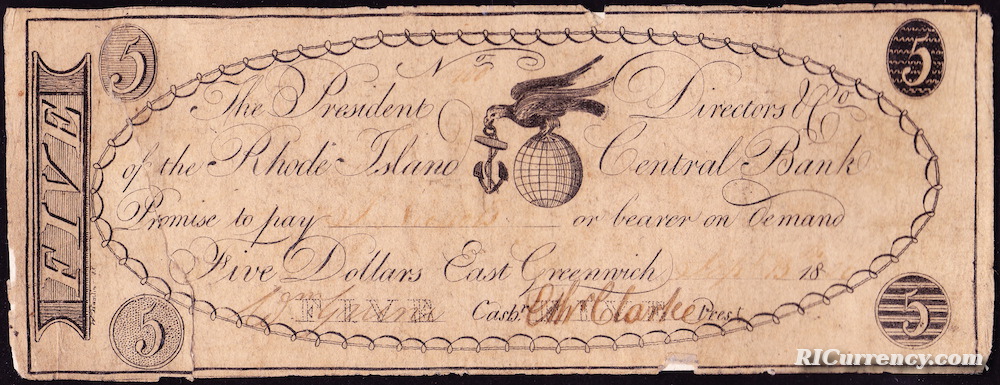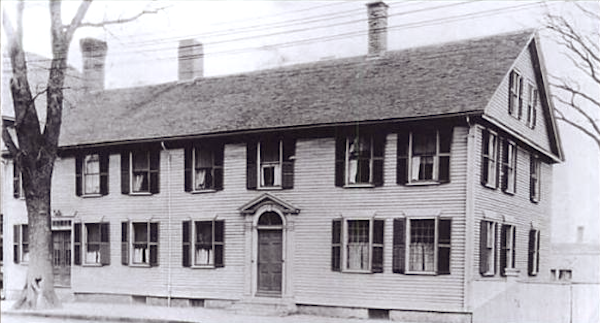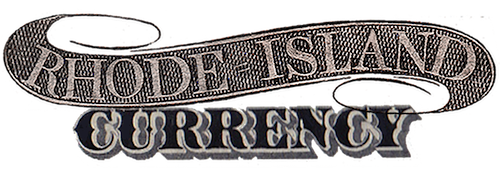R.I. Central Bank, East Greenwich
The Rhode Island Central Bank was founded in 1804. It occupied the Captain Benjamin Greene House on Main Street (between Division and King Streets) in East Greenwich between 1805 and 1840.
As Roger Durand notes in his book, Obsolete Notes and Scrip of Rhode Island and the Providence Plantations, the institution served the town well for many decades before falling into the hands of out-of-state adventurers who bankrupted the company by issuing currency it lacked the resources to back. In particular, notes from 1855 signed by James Y. Sangler, president, and William Bodfish, cashier, were from this period. The same is true of their successors, O.W. McKinsey, president, and L.D. Parker, cashier. (The four 1855 notes below bear McKinsey/Bodfish and McKinsey/Parker signatures.)
On December 29, 1857, the Supreme Court of Rhode Island declared a perpetual injunction against the bank for its financial improprieties.
On February 6, 1860, a rather interesting article entitled, “A Buck Hit,” appeared in Providence’s Manufacturers and Farmers Journal that gives some background on the R.I. Central Bank’s failure and shows the difficulty of dealing with a broken bank’s paper currency. It’s also an amusing artifact of the animosity between the North and the South before the start of the Civil War.
“The bit of correspondence subjoined, between the Receiver of the Rhode Island Central Bank and a small bill-holder of that institution in Missouri, who delights in the name of Buck, is too racy to be lost. The Receiver was appointed by a decree of our Supreme Court, under a proceeding against the bank upon the complaint of the Bank Commissioners, ‘for so managing its concerns that the public, or those having funds in its custody, were in danger of being defrauded.’
“In the judicial investigation then had, it appeared that in 1856 the bank had fallen into the hands of certain western speculators residing in Missouri and Illinois, who, having bought up, or obtained the control of all stock, endeavored, through its instrumentality, to supply their neighbors in the West with that chief good, ‘a circulating medium.’ Upon a capital consisting solely of their own notes, they issued and put off in the State of Missouri and elsewhere, the bills of the bank to the amount of about $400,000; so that when in September, 1857, the matter was brought to the attention of the Court, and the bank enjoined, the assets of the bank, to meet this large circulation, consisted principally of the notes of three firms for about $486,000, to wit: Sanger, Stewart & Co., for about $219,000; and of J. Anderson & Co. for about $127,000; both of St. Louis, Missouri; and of the firm of Smith & Goodell of Joliet, Illinois, for about $139,000.
“Pending the investigation, the circulation of the bank was reduced about one half; but the prospect of paying the outstanding bills of the bank depends upon the collection of these western ‘bills receivable,’ which the Receiver has put in suit. His polite and caustic reply to Buck, of Savannah, Andrew county, Missouri, has, therefore, in the fullest sense , the severity of truth.
“Sir- Enclosed please find two dollar bill on East Greenwich branch of Central Bank, Rhode Island, and you will send me amount of what the bill is worth in postage stamps, if it is only six cents. I have no hope of getting a cent, as you d—d Yankees are not in the habit of paying when you can help it.
Yours truly,
James W. Buck
Savannah, Andrew country, Missouri
“Providence, R.I., January, 1860
“Dear Sir- Your polite note, enclosing a two dollar bill of the Rhode Island Central Bank, is received, and the same is placed on file. The principal assets of the bank consist of certain promissory notes of citizens of Missouri and Illinois, which are now in suit. Whenever these citizens of your highly respectable State, and of the State of Illinois, see fit to pay these obligations, I shall be enabled to send you a handsome dividend upon, if not the whole amount, of your bill. In the meanwhile, believe me, with the highest respect and esteem,
Your very obedient servant,
J.M. Clarke
Receiver of R.I. Central Bank”







The Rhode Island Central Bank operated in the Capt. Benjamin Greene House on Main Street (between Division and King Streets) in East Greenwich between 1805 and 1840. The building was razed in 1938.
